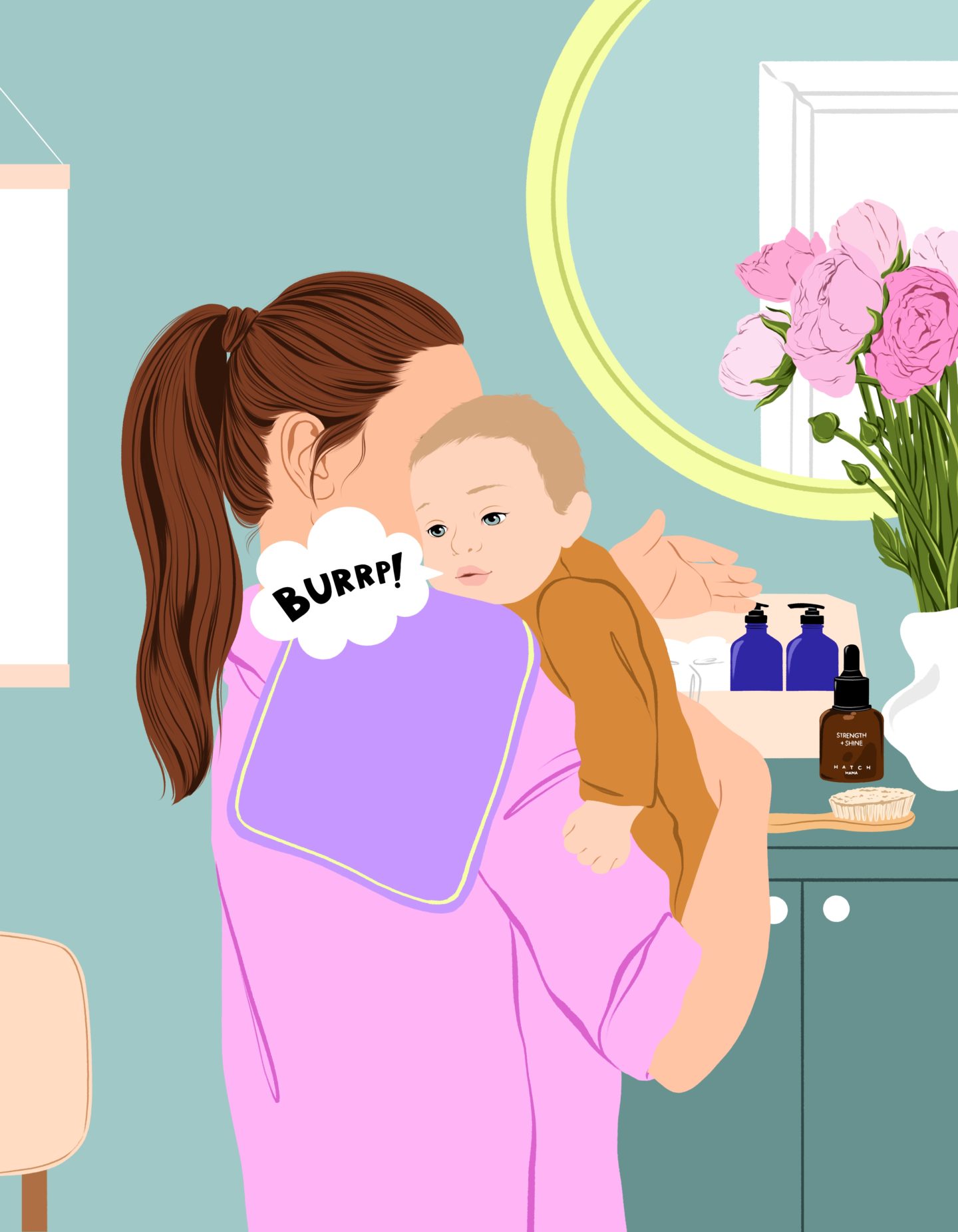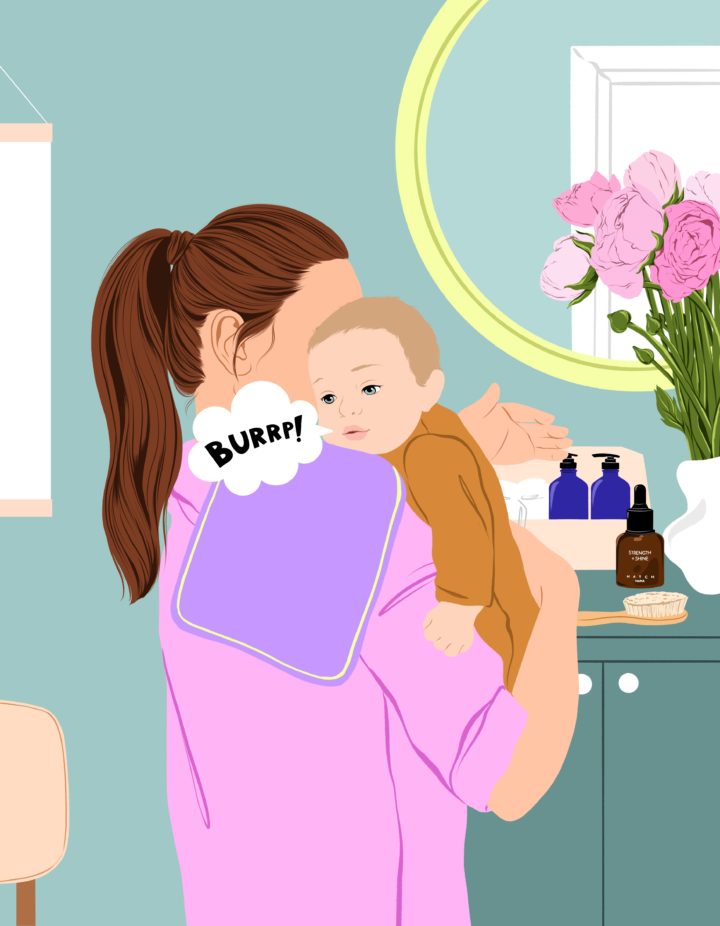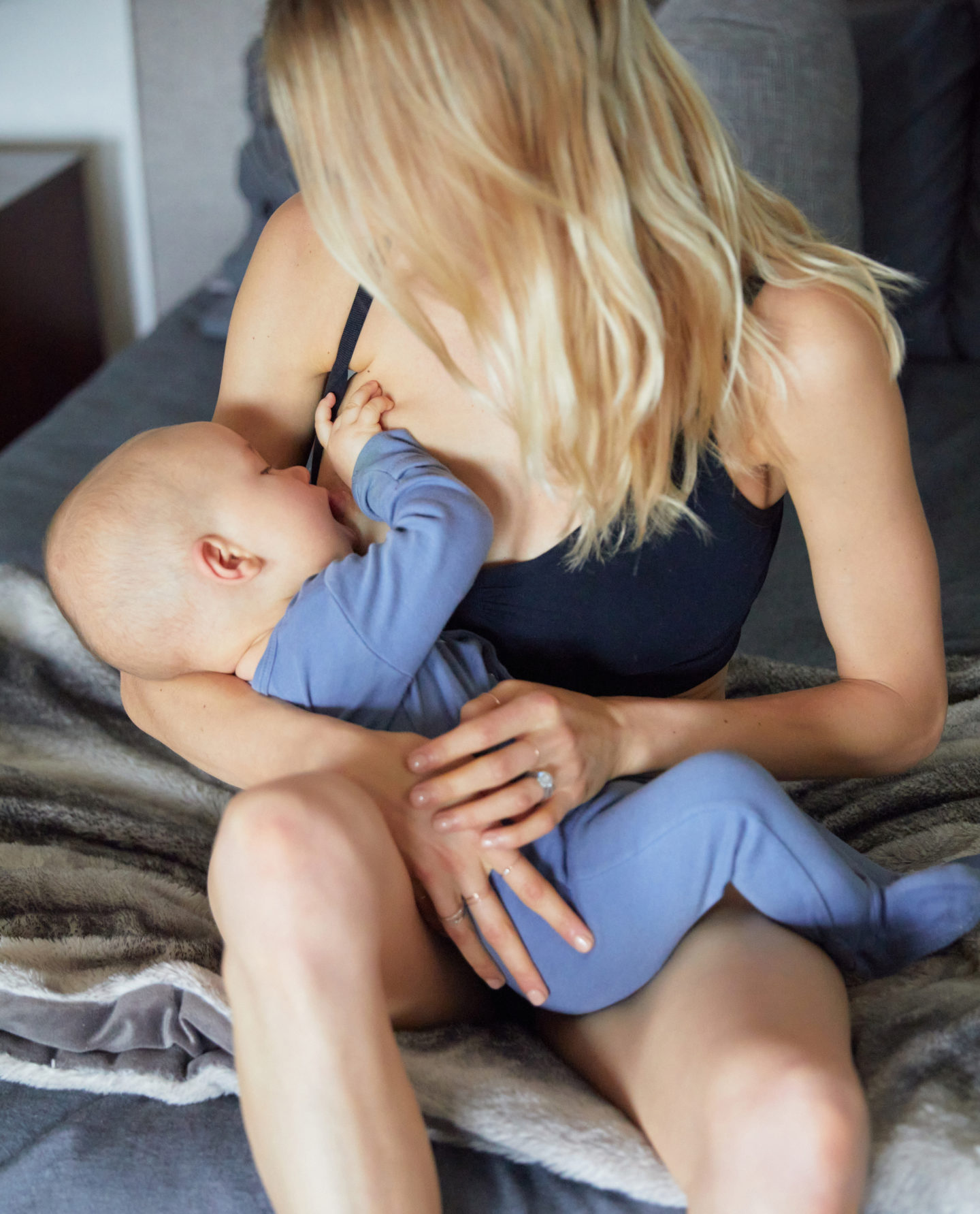Burping a baby can be a truly joyful experience. The moment they let out that beautiful, oh-so-sweet belch is like winning the feeding lottery.
On the flip side, there’s literally nothing worse than trying to help a babe who just can’t let one out. In case you didn’t know, burping helps babe get rid of some of the air they tend to swallow during feeding. Not being burped often enough and swallowing too much air can make a baby spit up or appear cranky or gassy.
Peep below for our tips on burping your baby like a pro.
Tips for Burping Babe
- First things first: Contrary to popular belief, you don’t want to smack your baby’s back when burping but rather try gently patting on your baby’s back, or even firmly circling their back with a flat palm should do the trick. Also, you never quite know what’s going to come out of your baby — whether a dry or wet burp — so always have a cloth nearby. (It’s called burp cloth for a reason!)
- Sit upright and, depending on their age, hold your baby against your chest or sit them up on your lap. Your baby’s chin should rest on your shoulder as you support the baby with one hand. With the other hand, gently pat your baby’s back in a circular motion. If on your lap, rest the bottom of your hand on your baby’s chest. Use the other hand to rub the baby’s back.
- If your baby seems agitated or grumpy while feeding, stop and try to burp them, and then begin feeding again. When bottle feeding, try burping your baby every two to three ounces. When breastfeeding, burp your baby each time you switch breasts.
- If your baby doesn’t burp after a few minutes, change their position. Try burping for a couple of minutes before feeding again. Always burp your baby when mealtime is over.
- If your baby spits up frequently, keep them upright after a meal for 10 to 15 minutes. This upright position can help prevent milk from coming back up. But if babe spits up, do not worry. It’s totes normal.
Sometimes, gassiness and fussiness go hand in hand. For example, babies with colic (marked by three hours or more of consistent crying a day) might be extra gassy from swallowing too much air while crying, making the baby even more uncomfortable. If your baby seems particularly uncomfortable, contact your pediatrician or healthcare provider.
Different Burping Techniques
Just like with breastfeeding, there are a few different positions you can try while burping your baby. Feel free to experiment until you find the one that you’re most comfortable with. The most common burping positions include:
1. Over the Shoulder
For this burping method, set your baby in the upright position, with their head gently resting on your shoulder, facing behind you. Your free hand will gently pat or rub your baby’s back. In this position, place a bib over your shoulder, covering the back of your shirt.
2. Face Down, Lying Across Your Lap
Put your baby face down across your lap. Use one hand to support the baby’s head and chin so that they can breathe properly while the other hand pats their back.
3. Sitting on Your Lap
Finally, sit your little one on your lap, facing away from you. Put one hand on the front of their chest and lean them forward slightly, supporting their chin and jaw (but not their throat).
4. Bicycle Method
If the fussiness continues, lie your baby on their back and move their legs back and forth, almost like they’re riding an itsy-bitsy bicycle. For an extra boost, try massaging your baby’s tummy.
Signs of a Baby That Needs To Be Burped
Babies can be tough customers. Eventually, you’ll be an expert in reading their body language, but when you’re still getting to know each other (and especially when they’re still figuring out how to communicate!), it can be tricky to figure out what your babe is trying to tell you.
If you’re a first-time mom and are new to baby burping, keep an eye out for the following signs that your newborn needs to burp:
- They wake up relatively soon after feeding. Most of the time, when babies wake up in the night, it’s because they’re hungry. If your sleeping baby quickly wakes after eating, they might need to burp.
- They become squirmy mid-feeding.
- They stop feeding early. If your baby normally chugs a whole bottle but is getting finicky or stops feeding halfway through, it could be a sign that they need to burp.
- They scrunch their knees up. Babies often do this to express discomfort or pain, so it could be a sign that they have trapped gas building up.
- Frequent spit-ups while feeding.
- A sucking sound while feeding. If it sounds like your babe is sucking in a lot of air, they probably are — in which case, they’ll need to burp pronto.
Different Burping Habits
While every baby will likely need to be burped at some point, there IS a difference between breastfed and bottle-fed babies. Experts say that typically breastfed babies need to be burped less because they swallow less air in the feeding process. (Swallowed air bubbles are what create a need to burp.)
It’s generally a good idea to try burping your babe in between every feeding, just to keep them comfortable. But don’t freak out if they don’t burp every time — sometimes, your little one just doesn’t need to burp, especially if you’re breastfeeding.
Other Important Info
Being a mom means basically being an expert in a lot of things, not just burping your little one. You’ll also become a pro at feeding your newborn, whether you choose bottle feeding or breastfeeding, putting your baby to sleep, and learning how to interpret the minute differences in their cries and facial expressions.
This can be overwhelming at first — trust us, we get it, and we want to help. Keep reading for a full list of some of our must-haves for new moms.
Mom Essentials
If you’re breastfeeding your newborn, invest in some nursing-friendly fits ASAP. Nothing is more annoying than having to hide in a bathroom because you can’t nurse without taking apart your whole outfit, and a good nursing top or nursing jumpsuit will take care of that problem for you.
For one of our favorite nursing-friendly shirts, look no further than The 24/7 Nursing Tank. This postpartum staple is made from a soft and stretchy blend guaranteed to keep you comfy and cool all summer (and winter: hello, hot flashes) long.
The snap front placket and built-in bra provide super easy access to your nips for when your baby starts demanding their next snack. It’s stylish. It’s comfy. Best of all, it makes nursing and pumping a breeze (or at least a tad easier.
Another one of our fourth-trimester faves: the Softest Rib Nursing Dress. This ribbed knit fabric legit feels like a cloud (and kind of looks like one, too, if you choose the Ivory colorway). Midi length, V-neck, half sleeves, and a fully functional button-up style seal the deal on a dress that’s equal parts functional and flattering.
Baby Essentials
Being a mom means shopping, like, a lot. It can be shocking just how much stuff your little one needs, even just to leave the hospital! One of our biggest tips to new moms is to start making a list of all these essentials early on in your pregnancy so that you can stay on top of the ball and feel totally prepared by the time your due date rolls around.
Those essentials include big-ticket items, such as:
- A baby carrier: you’ll need this to bring your baby home from the hospital.
- A baby car seat: you’ll ALSO need this to head home from the hospital.
- A stroller: Essential for showing off your perfect newborn baby (or at least your perfect outfit) around the neighborhood.
- A diaper bag: Get a top-tier one because this bad boy is going to be STUFFED.
- A bassinet or crib: see the experts for advice on choosing one or the other.
Baby Expert To-Be
New parents might be feeling stressed and overwhelmed by all this information — that’s okay. Becoming a new mom is a LOT, but that doesn’t mean you can’t handle it. Start by mastering one thing at a time, like burping. Once you’ve got that figured out, then worry about how to manage colic or when to introduce solid foods.
Just wait — you’ll be a baby expert in no time!
Sources:




